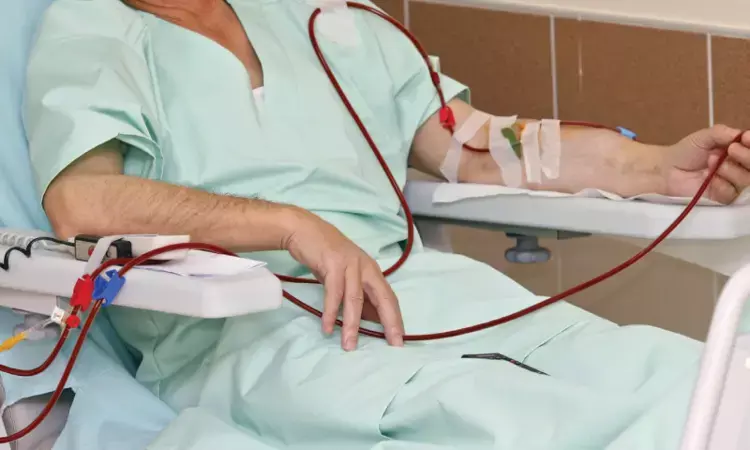- Home
- Medical news & Guidelines
- Anesthesiology
- Cardiology and CTVS
- Critical Care
- Dentistry
- Dermatology
- Diabetes and Endocrinology
- ENT
- Gastroenterology
- Medicine
- Nephrology
- Neurology
- Obstretics-Gynaecology
- Oncology
- Ophthalmology
- Orthopaedics
- Pediatrics-Neonatology
- Psychiatry
- Pulmonology
- Radiology
- Surgery
- Urology
- Laboratory Medicine
- Diet
- Nursing
- Paramedical
- Physiotherapy
- Health news
- Fact Check
- Bone Health Fact Check
- Brain Health Fact Check
- Cancer Related Fact Check
- Child Care Fact Check
- Dental and oral health fact check
- Diabetes and metabolic health fact check
- Diet and Nutrition Fact Check
- Eye and ENT Care Fact Check
- Fitness fact check
- Gut health fact check
- Heart health fact check
- Kidney health fact check
- Medical education fact check
- Men's health fact check
- Respiratory fact check
- Skin and hair care fact check
- Vaccine and Immunization fact check
- Women's health fact check
- AYUSH
- State News
- Andaman and Nicobar Islands
- Andhra Pradesh
- Arunachal Pradesh
- Assam
- Bihar
- Chandigarh
- Chattisgarh
- Dadra and Nagar Haveli
- Daman and Diu
- Delhi
- Goa
- Gujarat
- Haryana
- Himachal Pradesh
- Jammu & Kashmir
- Jharkhand
- Karnataka
- Kerala
- Ladakh
- Lakshadweep
- Madhya Pradesh
- Maharashtra
- Manipur
- Meghalaya
- Mizoram
- Nagaland
- Odisha
- Puducherry
- Punjab
- Rajasthan
- Sikkim
- Tamil Nadu
- Telangana
- Tripura
- Uttar Pradesh
- Uttrakhand
- West Bengal
- Medical Education
- Industry
Laxative use linked to lower hyperkalemia risk in patients with advanced CKD

Patients with advanced CKD experience increased intestinal potassium excretion. This compensatory mechanism may be enhanced by laxative use; however, little is known about the association of laxative use with risk of dyskalemia in advanced CKD.
Laxative use was independently associated with lower risk of hyperkalemia during the last 1-year pre-ESKD period, finds a recent study.
The research is published in the Journal of American Society of Nephrology.
Keiichi Sumida and colleagues from the Division of Nephrology, Department of Medicine, University of Tennessee Health Science Center, Memphis, Tennessee included a study population encompassing 36,116 United States veterans transitioning to ESKD with greater than or equal to one plasma potassium measurement during the last 1-year period before ESKD transition.
Using generalized estimating equations with adjustment for potential confounders, the authors examined the association of time-varying laxative use with risk of dyskalemia (i.e., hypokalemia [potassium <3.5 mEq/L] or hyperkalemia [>5.5 mEq/L]) versus normokalemia (3.5–5.5 mEq/L) over the 1-year pre-ESKD period.
To avoid potential overestimation of dyskalemia risk, potassium measurements within 7 days following a dyskalemia event were disregarded in the analyses.
It was observed that over the last 1-year pre-ESKD period, there were 319,219 repeated potassium measurements in the cohort. Out of these, 12,787 (4.0%) represented hypokalemia, and 15,842 (5.0%) represented hyperkalemia; the time-averaged potassium measurement was 4.5 mEq/L.
After multivariable adjustment, time-varying laxative use (compared with nonuse) was significantly associated with lower risk of hyperkalemia but was not associated with risk of hypokalemia. The results were robust to several sensitivity analyses.
As a result, the authors concluded that "laxative use was independently associated with lower risk of hyperkalemia during the last 1-year pre-ESKD period."
Our findings support a putative role of constipation in potassium disarrays and also support (with a careful consideration for the risk-benefit profiles) the therapeutic potential of laxatives in hyperkalemia management in advanced CKD, they authors further inferred.
Dr. Nandita Mohan is a practicing pediatric dentist with more than 5 years of clinical work experience. Along with this, she is equally interested in keeping herself up to date about the latest developments in the field of medicine and dentistry which is the driving force for her to be in association with Medical Dialogues. She also has her name attached with many publications; both national and international. She has pursued her BDS from Rajiv Gandhi University of Health Sciences, Bangalore and later went to enter her dream specialty (MDS) in the Department of Pedodontics and Preventive Dentistry from Pt. B.D. Sharma University of Health Sciences. Through all the years of experience, her core interest in learning something new has never stopped. She can be contacted at editorial@medicaldialogues.in. Contact no. 011-43720751
Dr Kamal Kant Kohli-MBBS, DTCD- a chest specialist with more than 30 years of practice and a flair for writing clinical articles, Dr Kamal Kant Kohli joined Medical Dialogues as a Chief Editor of Medical News. Besides writing articles, as an editor, he proofreads and verifies all the medical content published on Medical Dialogues including those coming from journals, studies,medical conferences,guidelines etc. Email: drkohli@medicaldialogues.in. Contact no. 011-43720751


